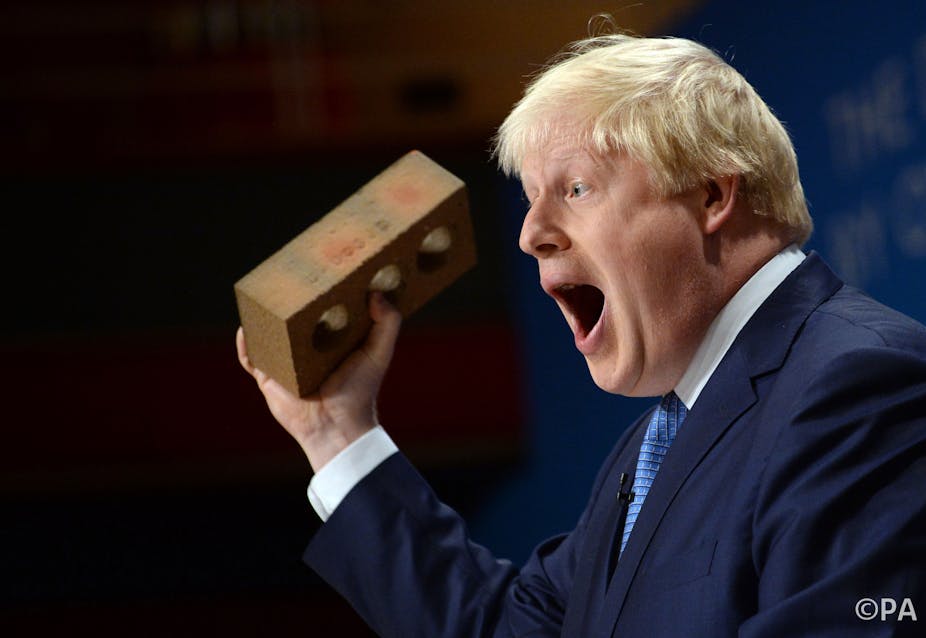Boris Johnson’s speech is always the highlight of the Conservative party conference. The appearance of the mayor of London is an eagerly anticipated moment of light relief from the barrage of announcements which usually flow from ministers at the meeting.
His speech this year was no different, with talk of asteroids, interstellar projectiles and the end of the “tapioca-like consensus” of opinion about Ed Miliband. There was also, of course, the uniquely-Boris choice of bringing a brick as a conference prop. There is no doubt he was entertaining, but this was not the speech of a future leader of the party or of a future prime minister.
Although he dismisses speculation of a future leadership bid as “outrageous hypotheses and conjectures”, most commentators believe Johnson harbours political ambitions which go well beyond his role as mayor.
A long way to Downing Street
If Johnson does, as some suspect, have his eye on Downing Street, then Conservative Party election rules will mean that there are a number of obstacles for him to overcome. And in light of his speech, these may prove to be his undoing.
Being mayor of what Johnson described today as the “capital of the world” is not enough to make him PM. He knows that he needs to return to parliament and is resting his hopes on the constituency of Uxbridge and South Ruislip.
This is a safe Conservative seat held by retiring MP John Randall so the task should not, in theory, be too hard. Johnson’s position as mayor makes this slightly more complicated, with some feeling that he cannot possibly hold both positions at the same time. But all government ministers hold down two big jobs – as constituency MP and government minister – and many other MPs have outside interests, often in industry or the law. Johnson could finish his term as mayor and represent his new constituency in the House of Commons at the same time.
To get to the top, Johnson must also win the support of his (soon-to-be) parliamentary colleagues. Conservative leadership election rules mean that he would need to firstly be selected by Conservative MPs (who whittle any prospective leadership candidates down to just two contenders), before the wider party membership is left to make the final decision.
This may prove to be a problem. Although he was on-message at the conference, singing the praises of Cameron as the man who will “lead this country into 2015 and beyond”, his speech will also have been a reminder that he is something of a loose cannon who loves to stir up controversy. He is ever popular with the rank and file of the party but he can make others nervous.
He clearly revelled in references to his bizarre vacuum cleaner comment from the preceding weekend and in making David Cameron squirm when he told the packed conference hall that they had “permission to purr”. We may put this down to harmless conference banter but it would be no surprise if Conservative MPs were left wondering how comfortable they would really feel sitting with him around the Cabinet table.
Finally and most importantly, Johnson needs to win the support of the general public in the general election if he wants to progress to the top job. He is undeniably popular, as a poll for The Sun recently demonstrated, but the prospect of a Prime Minister Johnson needs less of the buffoonery; and more of a policy-heavy political narrative.
He talked in his speech of economics, of business growth, apprenticeships and the housing boom. But his words remain steeped in the politics of London. It is always his reference point, his place of departure. There was a smattering of references to other parts of the UK – to Gloucestershire and Wiltshire – but we learnt little of his wider beliefs and convictions. In fact, the only policy that he really seemed to highlight was English votes for English laws. An important issue following the Scottish referendum, but this will hardly be a vote winner in 2015 or beyond.
His return to Westminster will definitely make Conservative party politics more colourful and – if deployed carefully – the BoJo brand could be a useful weapon in the Conservative armoury for the 2015 election. But few watching his speech will envisage him standing at the door of Downing Street.

